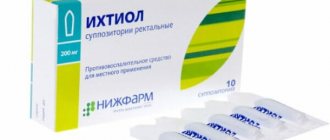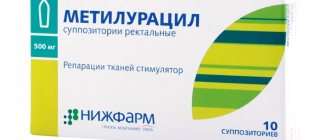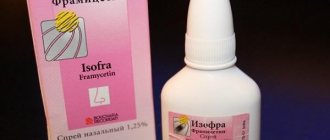Very often, the female body becomes vulnerable to pathological processes that are caused by pathogenic microflora. Vaginal Trichomonas, fungi of the genus Candida can cause serious diseases, which are accompanied by pain and itching.
They create a risk of infecting a sexual partner, and at the time of birth they can infect a newborn. To eliminate these pathologies, medications are prescribed in the form of suppositories, which are used topically in gynecology and are called Klion-D.
Pharmacodynamics and pharmacokinetics
The effect of the drug is due to the complex effect on the vaginal microflora of its constituent components.
Miconazole is an antifungal agent that destroys dermatophytes and yeasts , but does not disturb the pH or destroy healthy microflora in the vagina. The substance directly affects the synthesis of lipid components in the fungal membrane, thereby destroying it. It does not penetrate into the blood and is not found in the kidneys and products of the excretory organs; 90% remains in the vagina. The maximum concentration is after 8 hours.
Metronidazole is an antibiotic . It inhibits the process of RNA and DNA of destructive bacteria by restoring the 5-nitro group by transport proteins inside the cell. After entering the vagina, it penetrates into the blood. Its maximum concentration in the blood (half of the administered dose) can be detected after 9 hours.
pharmachologic effect
The active ingredients of Klion-d have antiprotozoal, antibacterial and antifungal effects.
The drug is active against:
- Giardia lamblia;
- Fusobacterium spp.;
- Prevotella spp.;
- Eubacterium spp.;
- Gardnerella vaginalis;
- Peptostreptococcus spp.;
- Bacteroides spp.;
- Peptococcus spp.;
- Entamoeba histolytica;
- Trichomonas vaginalis;
- Clostridium spp.;
Klion-d also has an antifungal effect against yeasts and dermatophytes, mainly against Candida albicans.
According to reviews, Klion-d is well tolerated and does not change the composition of the normal microflora and acidity of the vagina.
Interaction
The medicine is not combined with ethanol, disulfiram , non-depolarizing muscle relaxants, cimetidine, and lithium preparations .
When taking indirect anticoagulants , it is worth additionally monitoring the prothrombin index .
The effectiveness of metronidazole is reduced when combined with phenobarbital and phenytoin .
Side effects
The drug is well tolerated by patients, but in some cases the following adverse reactions develop:
- Change in urine color;
- Increased vaginal discharge;
- Changes in the clinical blood picture;
- From the central nervous system – dizziness and headaches;
- Allergic reactions - skin rash, urticaria, in rare cases, the development of angioedema;
- From the digestive tract - in rare cases, stool disturbances, changes in taste, dry mouth, nausea, abdominal pain, increased gas formation;
- Local manifestations - discomfort, itching, burning, swelling, redness of the mucous membranes, sensation of a foreign body in the vagina.
Analogs
Level 4 ATX code matches:
Gainomax
Sertaconazole
Ornisis
Metrogil Plus
Livarol
Flagyl
Ginofort
Zalain
Ketoconazole
Candide B6
Candide
Gyno-Travogen Ovulum
Kanizon
Metromicon-Neo
Lomexin
Neo-Penotran
Gyno-Pevaril
Ginesol
Antifungol
Analogs of suppositories are: Metromicon-Neo, Ginalgin, Clomezol, Neo-Penotran Forte, Clevazol, Pulsitex, Candibene, Ketodin, Candide, Ketonazole, Livarol, Metronidazole, Clotrimazole, Trichopolum, Econazole.
What is the difference between Klion and Klion-D 100?
Klion tablets contain metronidazole and have a wider range of applications. Usually, to combat trichomoniasis, oral intake of tablets alone is not enough, for which Klion-D 100 suppositories are prescribed.
Contraindications
Klion D cannot be prescribed if the patient has the following disorders:
- a decrease in the level of leukocytes, including in history;
- liver failure;
- individual tolerance to the composition of the drug, as well as other azoles;
- organic lesions of the spinal cord and brain, including epilepsy.
Treatment should be carried out with caution in patients with diabetes mellitus and microcirculation disorders.
Reviews about Klion-D 100
Reviews on forums: Overall good. Many people used Klion-D 100 for thrush and were satisfied with the result. Some women complain of severe side effects. The drug is quite effective not only against thrush, but also against other types of vaginitis .
Reviews during pregnancy: Despite the fact that the use of the product during pregnancy is not recommended, women are often prescribed suppositories.
Reviews of Klion-D 100 suppositories were divided; some women tolerated the medication well and it did not affect their children in any way. Many experienced severe burning, itching, abdominal pain and voluntarily stopped taking the drug.
Indications for use
Gynecological infection is the main area of application of Klion-D.
He is appointed:
- When infected with Trichomonas.
- In the case of candidal infections with a fungus of the genus candida.
- Vaginitis of various etiologies.
- Gardnerellosis.
Use of Klion-D suppositories during pregnancy
During the first trimester of pregnancy, the formation and formation of the internal organs of the future newborn occurs. Therefore, during this period, the use of candles should be avoided.
During subsequent pregnancy, the use of the drug is possible. But before this, the doctor carefully weighs all the pros and cons of this drug. Its appointment occurs in extreme cases, when a woman in labor really needs to eliminate the pathology that is caused by fungal microflora.
Also, Klion-D vaginal suppositories can be used before childbirth to cleanse the birth canal of pathological mycelium. This helps prevent infection of the newborn.
The ingredients of Klion-D suppositories pass into breast milk in small quantities, which makes it impossible to use this medicine. If an appointment nevertheless occurs, breastfeeding is temporarily stopped.
Using Klion-D for thrush
The course of treatment for this pathological disease should not exceed ten days. The recommended dose is a single use of vaginal suppositories before bedtime. Treatment is not carried out in the morning.
After 1 month, if necessary, the course of treatment can be repeated. If treatment is ineffective, a laboratory test must be performed.
Make a bacterial culture of vaginal contents and establish the tolerance of a drug that can resist bacterial microflora.
Use for trichomoniasis
The course of treatment, dosage, and method of application are exactly the same as for the treatment of thrush. It is also possible, if necessary, to extend the course after a month.
Use during menstruation
During the menstrual cycle, women experience bleeding from the vagina.
If you put a suppository with this drug at this time, it may partially dissolve in them, and as a result, it makes no sense to treat the disease, since its therapeutic effect is reduced, which leads to an incomplete cure from the pathological process of the disease.
It is necessary to interrupt the course of treatment for the entire period of menstruation, and after it ends, resume it again.
Use of Klion-D for kidney and liver diseases
As noted earlier, Klion-D suppositories are not prescribed for severe liver damage (cirrhosis, hepatitis of various etiologies).
Renal failure, in the final stages, also precludes the use of this drug.
Price Klion-D 100 (where to buy)
On average, the price of Klion-D 100 suppositories in Ukraine is 100 UAH for 10 vaginal tablets.
How much does it cost to buy medicine in Kyiv? About 120 UAH for 10 pieces.
- Online pharmacies in UkraineUkraine
- Online pharmacies in KazakhstanKazakhstan
Pharmacy24
- Klion-D 100 N10 tablets VAT "Gedeon Richter", Ugorshchina
201 UAH. order
PaniPharmacy
- Klion-D 100 tablets Klion D tab. vag. No. 10 Hungary, Gedeon Richter
212 UAH order
show more
Description and composition
The drug is available in the form of white, oval, biconvex vaginal tablets. They have a pointed end and "100" written on one side.
They contain metronidazole and miconazole nitrate as active ingredients.
In addition to them, the medicine contains the following additional substances:
- E572;
- povidone;
- Aerosil;
- sodium lauryl sulfate and bicarbonate;
- dioxysuccinic acid;
- sodium carboxymethyl starch;
- crospovidone;
- hypromellose;
- milk sugar.
Applications and dosages
for adults
The drug is inserted deep into the vagina, 1 tablet at night, before which it must be moistened with water. At the same time, you need to take metronidazole orally. The course of therapy is 10 days.
for children
In children over 12 years of age, the drug is used as usual.
for pregnant women and during lactation
Patients in the second and third trimester of pregnancy do not require adjustment of the treatment regimen.
special instructions
During therapy, it is advisable to refrain from intimacy. Both sexual partners should undergo treatment.
Metronidazole may cause immobilization of treponema, possibly resulting in a false-positive Nelson test.
Due to the use of the drug Klion D, a decrease in the number of leukocytes may be observed, therefore, before starting therapy and at the end of it, it is worth taking a general blood test.
If undesirable reactions from the central nervous system are observed, then you should refrain from driving a car or working in a potentially hazardous workplace.
Klion
Orally and parenterally.
Orally, during or after meals (or with milk), without chewing.
For trichomoniasis - 250 mg 2 times a day for 10 days or 400 mg 2 times a day for 5-8 days. Women must additionally be prescribed vaginal suppositories or vaginal tablets with metronidazole.
If necessary, you can repeat the course of treatment with Klion or increase the dose to 0.75-1 g/day. Between courses you should take a break of 3-4 weeks with repeated control laboratory tests.
An alternative treatment regimen is to prescribe 2 g once to the patient and his sexual partner.
Children 2-5 years old – 250 mg/day; 5-10 years – 250-375 mg/day, over 10 years – 500 mg/day. The daily dose should be divided into 2 doses. The course of treatment is 10 days.
For giardiasis - 500 mg 2 times a day for 5-7 days.
Children under 1 year old – 125 mg/day, 2-4 years old – 250 mg/day, 5-8 years old – 375 mg/day, over 8 years old – 500 mg/day (in 2 doses). The course of treatment is 5 days.
For giardiasis - 15 mg/kg/day in 3 divided doses for 5 days.
Adults: for asymptomatic amebiasis (if a cyst is detected), the daily dose is 1-1.5 g (500 mg 2-3 times a day) for 5-7 days.
For chronic amebiasis, the daily dose is 1.5 g in 3 divided doses for 5-10 days, for acute amoebic dysentery - 2.25 g in 3 divided doses until the symptoms stop.
For liver abscess, the maximum daily dose is 2.5 g in 1 or 2-3 doses, for 3-5 days, in combination with antibiotics (tetracyclines) and other methods of therapy.
Children 1-3 years old - 1/4 adult dose, 3-7 years old - 1/3 adult dose, 7-10 years old - 1/2 adult dose.
For balantidiasis - 750 mg 3 times a day for 5-6 days.
For ulcerative stomatitis, adults are prescribed 500 mg 2 times a day for 3-5 days; In this case, the drug is not indicated for children.
For pseudomembranous colitis - 500 mg 3-4 times a day.
For eradication of Helicobacter pylori - 500 mg 3 times a day for 7 days (as part of combination therapy, for example, a combination with amoxicillin 2.25 g/day).
When treating anaerobic infection, the maximum daily dose is 1.5-2 g.
In the treatment of chronic alcoholism, 500 mg/day is prescribed for a period of up to 6 (not more than) months.
To prevent infectious complications - 750-1500 mg/day in 3 divided doses 3-4 days before surgery or 1 g once on the first day after surgery. 1-2 days after surgery (when oral administration is already allowed) - 750 mg/day for 7 days.
In case of severe renal dysfunction (creatinine clearance less than 10 ml/min), the daily dose should be reduced by 2 times.
Suspension for oral administration. Anaerobic bacterial infections: children – 7 mg/kg every 8 hours, course of treatment – 7-10 days; Giardiasis: children 2-5 years old – 200 mg/day, 5-10 years old – 300 mg/day, 10-15 years old – 400 mg/day. The duration of treatment for giardiasis is 5 days. The course of treatment can be repeated after 10-15 days
Parenterally. For adults and children over 12 years of age, the initial dose is 0.5-1 g intravenously (infusion duration is 30-40 minutes), and then every 8 hours, 500 mg at a rate of 5 ml/min. If well tolerated, after the first 2-3 infusions they switch to jet administration. The course of treatment is 7 days.
If necessary, intravenous administration is continued for a longer time. The maximum daily dose is 4 g. According to indications, switch to maintenance oral administration at a dose of 400 mg 3 times a day. Children under 12 years of age are prescribed according to the same regimen in a single dose - 7.
5 mg/kg.
For purulent-septic diseases, 1 course of treatment is usually carried out.
For preventive purposes, adults and children over 12 years of age are prescribed 0.5-1 g intravenously on the eve of surgery, on the day of surgery and the next day - 1.5 g / day (500 mg every 8 hours). After 1-2 days, they switch to maintenance therapy orally. For patients with chronic renal failure and creatinine clearance less than 30 ml/min and/or liver failure, the maximum daily dose is no more than 1 g, the frequency of administration is 2 times a day.
As a radiosensitizing drug, it is administered intravenously at a rate of 160 mg/kg or 4-6 g/sq.m of body surface 0.5-1 hour before the start of irradiation. Apply before each irradiation session for 1-2 weeks.
During the remaining period of radiation treatment, therapy with Klion is not carried out. The maximum single dose should not exceed 10 g, course dose – 60 g.
To relieve intoxication caused by radiation, drip administration of a 5% dextrose solution, Hemodez or 0.9% NaCl solution is used.
For cervical and uterine cancer, skin cancer, they are used in the form of local applications (3 g dissolved in a 10% DMSO solution), moisten tampons, which are used topically, 1.5-2 hours before irradiation). In case of poor tumor regression, applications are carried out throughout the entire course of radiation therapy. If there is a positive dynamics of tumor clearance from necrosis - during the first 2 weeks of treatment.
Source: https://www.webapteka.ru/drugbase/name3134.html
Overdose
When using metronidazole intravaginally, an overdose is unlikely, but if it is taken orally at the same time, the following effects may be observed:
- nausea, vomiting, loose stools, abdominal pain;
- ataxia, paresthesia;
- generalized itching;
- metallic taste in the mouth;
- convulsions;
- decreased leukocyte levels;
- darkening of urine;
- dizziness;
- peripheral neuropathy.
There are no known signs of miconazole overdose.
In case of accidental ingestion of the drug, gastric lavage, hemodialysis are performed, and an adsorbent is given to drink; if necessary, sympathetic treatment can be carried out.
Instructions for use of the drug
Vaginal tablets are a local antibiotic. They require a doctor's prescription and strict adherence to the instructions for use. Otherwise, the therapeutic effect worsens or is not observed at all.
Indications
According to the official instructions, Klion-D tablets are used for pathologies that are simultaneously caused by Trichomonas spp. and Candida spp. It is advisable to use for thrush, trichomoniasis and other diseases. It is used for prophylactic purposes after surgery to prevent infectious complications.
Instructions for use
The method of using the tablets is deep into the vagina. Before use, you must wash your hands with soap, since the medicine must be injected as deeply as possible. Hygiene of the external genitalia is also necessary immediately before using the product.
Method of use:
- If a woman has trichomoniasis, accompanied by heavy discharge, itching and burning, and other symptoms, then a pill is prescribed in the evening - preferably before bed. Therapeutic course is 10 days. For greater effect, Metronidazole tablets are usually prescribed at the same time.
- Against the background of thrush, the frequency of use is once a day. Every day, a tablet moistened with warm water is inserted deep into the vagina. The course of treatment is 10 days, but if the effect is insufficient, repetition without interruption is allowed.
It is not recommended to use suppositories during menstruation, as the presence of blood reduces the therapeutic effectiveness. In addition, the active components are washed out along with menstrual flow, which reduces the content of metronidazole and miconazole.
Use during pregnancy and breastfeeding
In the 1st trimester, Klion-D tablets are strictly prohibited for use, as they contain substances that quickly enter the circulatory system and can penetrate the placental barrier. In the 2-3 trimesters, vaginal tablets are prescribed in cases where the benefit from them is higher than the probable harm to the fetus and the woman.
Since metronidazole, despite local use, still ends up in the bloodstream, Klion-D suppositories are prohibited during lactation. During treatment, breastfeeding is stopped, and you can return to lactation only 48 hours after stopping the drug.
Contraindications of the drug
Local use of vaginal tablets Klion-D has a number of prohibitions. Do not use against the background of hypersensitivity to active substances or auxiliary components.
Other contraindications:
- If a woman has a history of leukopenia.
- Lesions of the central nervous system of an organic nature.
- Liver failure.
- First trimester of pregnancy.
- Breastfeeding time.
- Children under 12 years of age.
The drug Klion-D is prescribed with extreme caution against the background of diabetes mellitus and microcirculation disorders. If there is a history of cervical erosion, use suppositories only under medical supervision.
Side effects
In most cases, Klion-D vaginal tablets are well tolerated by patients. Local side effects rarely develop, and even less frequently, systemic adverse reactions occur.
Local side effects include a short burning sensation and pain after administration of the tablet; Vaginal discharge is white, thick, there is no or weak odor.
Systemic negative phenomena:
- Nausea, vomiting.
- Disorders of taste perception.
- Metallic taste in the mouth.
- Decreased appetite.
- Pain in the epigastric region.
- Abnormal stool – diarrhea or constipation.
- Headaches, dizziness during treatment.
- Development of leukopenia.
- Allergic symptoms - skin rashes, itching.
In some cases, side effects from the urinary system occur. They are manifested by frequent urination, urine coloring red or brown.
Overdose of Klion-D tablets for topical use is excluded. However, parallel use with Metronidazole tablets leads to systemic side effects. Symptoms are vomiting, itching all over the body, disturbances in motor movements, convulsions, darkening of the urine.









